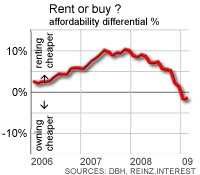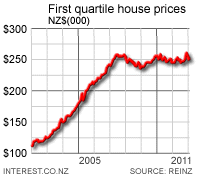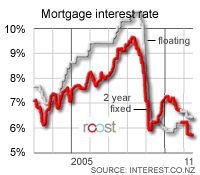By Bernard Hickey  The common refrain from potential home buyers for years has been that it is cheaper to rent than to buy. The sharp rise in house prices from 2003 to the end of 2007 combined with a rise in the 2 year fixed mortgage rate from 6% to almost 10% over the same period seemed to be the death knell for many dreams of home ownership. But that picture has changed dramatically in the last year as interest rates have fallen, house prices have fallen, rents have remained broadly stable and after tax pay has improved because of wage growth and tax cuts. We have extended the work we at interest.co.nz have done on home loan affordability to look at the question of affordability of renting versus the affordability of buying. Our analysis shows that it is now cheaper for a typical first home buyers' household to buy than to rent, as long as the cost of rates, maintenance and insurance is excluded. It also excludes the opportunity cost of interest earnt on a deposit that has been sunk into a property.
The common refrain from potential home buyers for years has been that it is cheaper to rent than to buy. The sharp rise in house prices from 2003 to the end of 2007 combined with a rise in the 2 year fixed mortgage rate from 6% to almost 10% over the same period seemed to be the death knell for many dreams of home ownership. But that picture has changed dramatically in the last year as interest rates have fallen, house prices have fallen, rents have remained broadly stable and after tax pay has improved because of wage growth and tax cuts. We have extended the work we at interest.co.nz have done on home loan affordability to look at the question of affordability of renting versus the affordability of buying. Our analysis shows that it is now cheaper for a typical first home buyers' household to buy than to rent, as long as the cost of rates, maintenance and insurance is excluded. It also excludes the opportunity cost of interest earnt on a deposit that has been sunk into a property.  Measuring these 'extra' costs of home ownership is important, but we haven't yet found the 'typical' meaures, given the variances in rates bills, insurance and maintainance, depending on the type and location of property. But the picture is very clear. The major cost of home ownership, interest costs on an 80% mortgage, were around 1.5% less than the rent on a similar sized house in January and February. This is the first time since we started collecting the data back at the beginning of 2006 that it was cheaper to buy than to rent and is a major improvement on the 10.3% premium for buying over renting back in November 2007. We are assuming that household is made up of two 25-29 median salary earners who are considering moving into a median 3 bedroom rental house rather than buying a 1st quartile priced house (ie the midpoint between the lowest priced houses and the median house price). This is the 'classic' couple at that point where they are considering starting a family.
Measuring these 'extra' costs of home ownership is important, but we haven't yet found the 'typical' meaures, given the variances in rates bills, insurance and maintainance, depending on the type and location of property. But the picture is very clear. The major cost of home ownership, interest costs on an 80% mortgage, were around 1.5% less than the rent on a similar sized house in January and February. This is the first time since we started collecting the data back at the beginning of 2006 that it was cheaper to buy than to rent and is a major improvement on the 10.3% premium for buying over renting back in November 2007. We are assuming that household is made up of two 25-29 median salary earners who are considering moving into a median 3 bedroom rental house rather than buying a 1st quartile priced house (ie the midpoint between the lowest priced houses and the median house price). This is the 'classic' couple at that point where they are considering starting a family.
 This is where the dream of home ownership is most potent and we think the decision-making point is most concentrated. We have heard in recent years again and again where couples in their mid to late 20s have come to this point and decided to leave New Zealand because there was no hope they could buy a home and start a family. I'm sure it was one of the driving factors in the exodus of young New Zealanders (and their parents) to Australia in the last three years.
This is where the dream of home ownership is most potent and we think the decision-making point is most concentrated. We have heard in recent years again and again where couples in their mid to late 20s have come to this point and decided to leave New Zealand because there was no hope they could buy a home and start a family. I'm sure it was one of the driving factors in the exodus of young New Zealanders (and their parents) to Australia in the last three years.
Now that gap has narrowed to the point in February where it has gone negative for the first time. It now takes 23.7% of after-tax pay to afford the rent on a three bedroom house, while it takes 22.3% to afford the mortgage. Obviously, the costs of maintainance, insurance and rates will mean it is still more expensive to own a home, but it is now within that margin of error where the heart can conquer the head. Another way of describing it is to say the foot-loose and fancy free husband no longer has any good excuses to put off the nesting instincts of the wife. In other words, it's time for another baby boom. Complaints please to bernard.hickey@interest.co.nz. So what might this all mean for the property market and New Zealand's demographics?  Real estate agents have said to first home buyers for years that rent was 'wasted' money that could be put to better use in 'compulsory saving' on the mortgage. Of course, this isn't strictly true and pointing out the the obvious extra expense of a home loan made for an easy rebuff. Not for much longer. But it may not contribute to a rebound in house prices. Banks are now much tougher with their lending criteria, particularly for those wanting to borrow more than 80% of the value of a home. The lure in days gone by of easy capital gains has also evaporated, discouraging the sort of highly leveraged first home buying seen through 2005, 2006 and 2007. Sales volumes, however, are already picking up as first home buyers dip their toe back in the real estate market to snap up bargains from distressed sellers. This shift in the rent vs buy calculation is also great news for New Zealand's population trends, discouraging migration of New Zealand-born citizens and encouraging family formation with all the social benefits that entails. It all depends on house prices continuing to fall, interest rates staying low, rents not falling too much and incomes continuing to rise. This analysis also excludes the effects of rising unemployment. That may be the variable that renders this structural change in our economy redundant for now.
Real estate agents have said to first home buyers for years that rent was 'wasted' money that could be put to better use in 'compulsory saving' on the mortgage. Of course, this isn't strictly true and pointing out the the obvious extra expense of a home loan made for an easy rebuff. Not for much longer. But it may not contribute to a rebound in house prices. Banks are now much tougher with their lending criteria, particularly for those wanting to borrow more than 80% of the value of a home. The lure in days gone by of easy capital gains has also evaporated, discouraging the sort of highly leveraged first home buying seen through 2005, 2006 and 2007. Sales volumes, however, are already picking up as first home buyers dip their toe back in the real estate market to snap up bargains from distressed sellers. This shift in the rent vs buy calculation is also great news for New Zealand's population trends, discouraging migration of New Zealand-born citizens and encouraging family formation with all the social benefits that entails. It all depends on house prices continuing to fall, interest rates staying low, rents not falling too much and incomes continuing to rise. This analysis also excludes the effects of rising unemployment. That may be the variable that renders this structural change in our economy redundant for now.

We welcome your comments below. If you are not already registered, please register to comment
Remember we welcome robust, respectful and insightful debate. We don't welcome abusive or defamatory comments and will de-register those repeatedly making such comments. Our current comment policy is here.